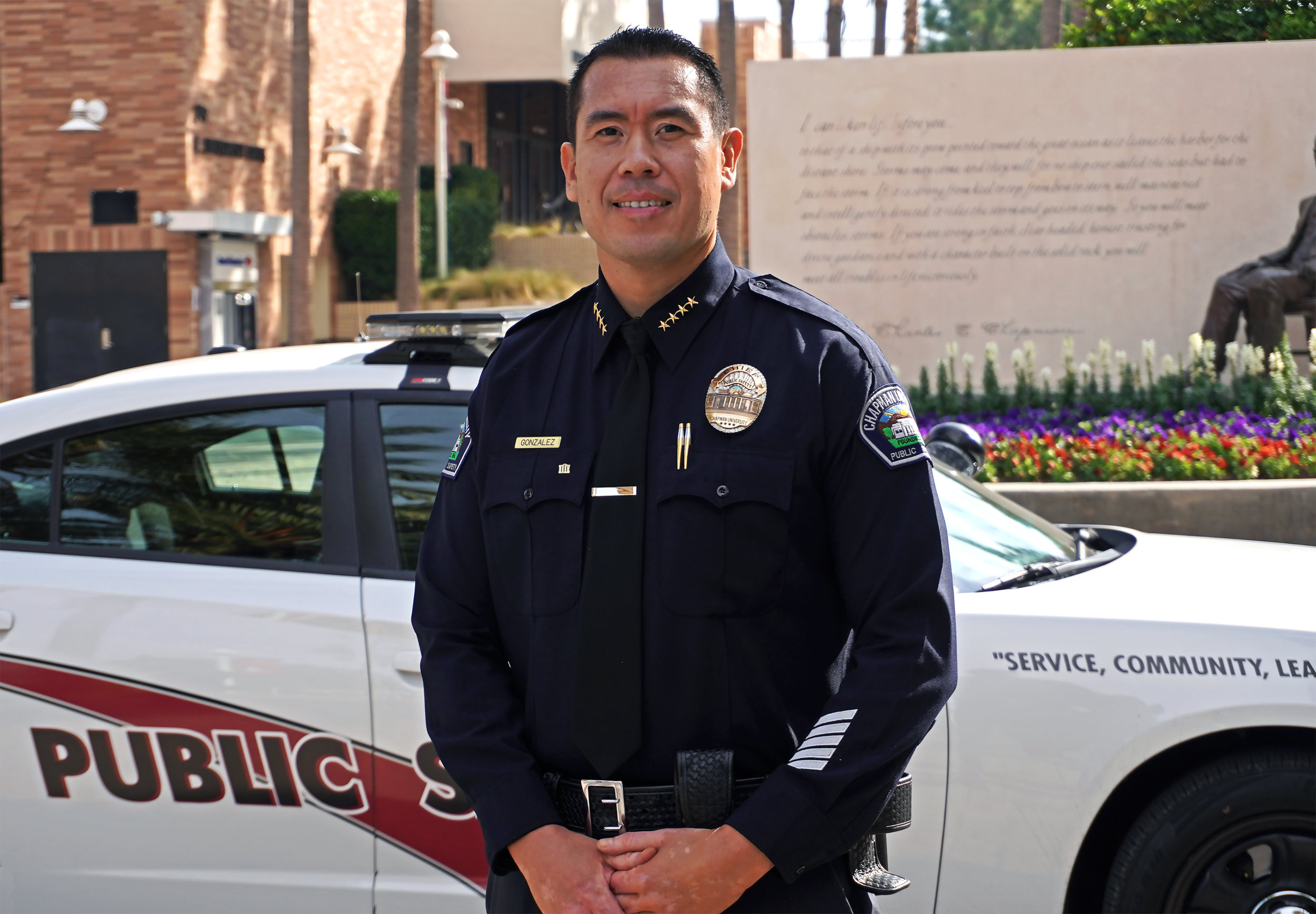Rick Gonzalez promoted to chief of Public Safety, department merges to form Enterprise Risk and Safety
Rick Gonzalez, former deputy chief of Chapman University Public Safety, was promoted to chief March 1 following the retirement of his predecessor. The shift in leadership corresponds with the merge of the department and other risk and safety offices to create Enterprise Risk and Safety. SIMRAH AHMAD, Staff Photographer
Rick Gonzalez, current chief of Chapman University Public Safety (PSAFE) as of March 1, joined the department as deputy chief in August 2017 — though not without higher aspirations.
In the fall of 1997, 20-year-old Gonzalez was hired to his first job working in campus public safety at the University of Southern California (USC) by Chapman’s former Chief of PSAFE Randy Burba, who, at the time, was captain of USC’s public safety.. Ever since, Gonzalez dreamed of one day becoming chief himself — a goal he reiterated to Burba over the course of their time working together.
Years passed, and with them, Gonzalez achieved his goal, albeit at a much smaller campus, as chief of Safety & Security at Otis College of Art and Design in Los Angeles. But when Burba was hired to take over as Chapman’s chief of PSAFE in 2017, he recruited Gonzalez with some ulterior motives of his own.
“Chief Burba always knew that eventually he was going to retire, so when he brought me in, I was part of that succession plan,” Gonzalez told The Panther. “He knew that, in order for the department to be successful, you don’t want to bring in an outsider. Usually, when you do that, it takes three or four years before (they) really learn the culture and can start implementing (changes).”
For the last four and a half years, learning is exactly what Gonzalez did under the mentorship of Burba, preparing for an inevitable change in leadership.
“I wanted to hire somebody that I knew could take over,” Burba told The Panther in a Feb. 28 interview. “Rick’s been in this business for over 20 years: he’s got the experience, and he’s got the understanding of how to work in this environment.”
One of Gonzalez’ primary objectives in his new position is to get Chapman PSAFE accredited through the International Association of Campus Law Enforcement Administrators (IACLEA), which he described as an honor bestowed to select public safety departments following best practices and national standards.
The process of receiving accreditation is lengthy, but succinctly explained in five phases on the IACLEA website: candidacy, self-assessment, on-site assessment, commission review and award and maintain compliance. The self-assessment process alone can take up to 36 months.
“It’s huge; (IACLEA) is international, so it’s pretty hard to get,” Gonzalez said. “There’s not a lot of smaller Public Safety departments that have (accreditation); it’s usually bigger schools or actual police departments that have it.”
Currently, Chapman PSAFE has about 45 employees, though larger institutions like USC can require upward of 400, according to Gonzalez.
But the department just got a whole lot bigger following the March 1 promotion of former Associate Vice President of Risk Management Al Vasquez, a retired police chief, to the position of vice president for Enterprise Risk and Safety. This “enterprise” refers to the reorganization of Chapman’s various risk and safety offices — Environmental Health & Safety, Risk Management, Insurance, Fire & Life Safety, Emergency Management, Parking and Transportation and PSAFE — into one condensed department.
“We interact with those departments almost on a daily basis,” Gonzalez said. “It’s good that we all fall under one person … being one department, we’re going to be working together daily.”
Gonzalez noted the integrity of PSAFE will remain the same under new leadership — specifically the emphasis Burba placed on building strong relationships with the campus community. Being both Latinx and a first-generation college student, Gonzalez hopes his background will allow him to connect on a deeper level with students from minority communities and bring a fresh perspective to the department.
“It’s easier (to connect) when you have some common ground or experiences you can share (with students),” Gonzalez said. “It helps to build trust, because (students) can relate to that.”
Despite being offered the promotion mid-semester, Gonzalez said the transition to the new role was smooth. His biggest concern for the future, however, is navigating the lessening of COVID-19 protocols on campus.
Gonzalez explained to The Panther the difficulties that accompany trying to predict what a post-pandemic college campus looks like. In the weeks that follow, the new chief will have to reevaluate the allocation of COVID-19 resources on campus as well as how much to actually prioritize COVID-19 response efforts amid an “endemic.”
He added that the easing of restrictions also enables him to facilitate more in-person events to meet students on campus. Though Gonzalez has yet to confirm a regular date, he told The Panther he hopes to set up an open “Coffee with the Chief” event as a recurring opportunity for students to meet their chief of PSAFE.
“Everybody drinks coffee — everybody drinks Starbucks — so come get a free cup of coffee with the chief,” Gonzalez said. “We can just sit down, talk and start building relationships. (I want) to be accessible, so I can hear directly from the students.”

